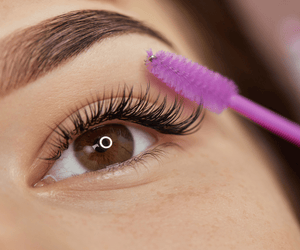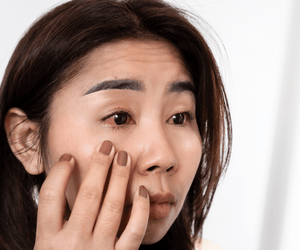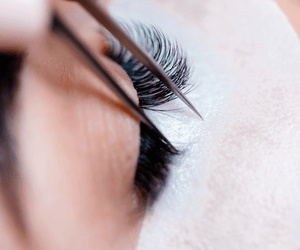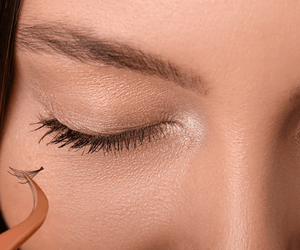Biotin is one of the most popular beauty vitamins, with a reputation for improving everything from nail strength to hair growth. Because of its incredible reputation as a supplement, you may find yourself wondering — does biotin help eyelashes grow?
As with many other supplements, there is limited evidence showing that biotin can help with lashes, and any effects it may have are determined by your personal nutritional needs. In this guide, we’ll dig into the science of biotin for eyelashes to help you figure out if it’s right for you.
Table of Contents
What is biotin?
Biotin, also known as vitamin B7, is a naturally-occurring, water soluble vitamin. It helps your body metabolize macronutrients like fatty acids, glucose, and amino acids, breaking them down into smaller components that your body can use for energy and renewal.
The average adult only needs around 30 mcg of biotin per day, which is easy to obtain with a balanced diet. The main dietary sources of biotin include eggs, meat (especially organ meat such as liver), fish like salmon or tuna, and various nuts, seeds, legumes, and leafy green vegetables.
Biotin is often marketed as a supplement for hair, nails, and skin, which is why some people may believe it can help improve eyelash growth.
Why biotin might impact eyelash growth?
As an important nutrient for metabolism, biotin helps the body process proteins. This is needed for the production of keratin, the protein that all hair (including eyelashes) is made of. However, biotin’s effect on keratin production isn’t direct. It’s just one participant in a complex and multi-factorial process.
Biotin deficiencies can lead to hair and lash loss, but so can deficiencies in other macro- or micronutrients such as protein, zinc, or iron. Studies have shown that for those with biotin deficiencies, supplementing with the vitamin helps improve hair growth, as well as skin and nail health. This is because it simply helps maintain baseline functions. There are likely no benefits to consuming more biotin than your body needs.
What the science says?
The most recent scientific review, published in the Journal of Clinical Aesthetic Dermatology in 2024, found that most papers looking at biotin’s effects either had participants with pre-existing deficiencies or significant methodological errors.
In cases where participants did have a biotin deficiency, however, supplementation was able to improve hair growth. While no studies have looked at biotin specifically for lash growth, it’s reasonable to assume that the effects would be similar — again, assuming an underlying deficiency or issue with processing biotin.
How to use biotin for lashes?
Supplements
If you are dealing with lash loss as a result of a biotin deficiency, a supplement could be the solution — and it may also help with any other health problems you’ve been facing as a result of the deficiency.
The average adult only needs 30mcg of biotin per day, yet supplement brands often recommend a daily serving of 5000-1000 mcg of biotin. Larger doses may be beneficial in cases of significant deficiency or if you are deficient in biotinidase, the enzyme that helps your body recycle biotin.
You may start seeing improvements to lash and hair growth within a few weeks, but it generally takes several months to achieve complete balance. Speak to your doctor to see if biotin supplements are right for you, and to rule out any other potential causes for lash loss.
Topical serums
Nowadays, there are also many topical lash serums made with biotin, likely due to the strong association between biotin and lash growth. However, there is almost no research on topical biotin use, and certainly not for the lashes.
That said, many lash growth serums contain other ingredients that can help boost lash follicle function for stronger, healthier lashes, including signaling peptides and prostaglandin analogs.
If you do opt for a lash serum, it’s important to use it consistently for once to twice per day, and it can take several months to see results. You should also keep in mind that once you stop using the serum, your lash growth may return to normal.
Is biotin safe?
Biotin is considered safe, with no known contraindications or drug interactions. Because it is water-soluble, your body simply excretes any biotin that it doesn’t need.
The only potential risk with biotin is that it may interfere with test results, especially for thyroid function tests or tests looking at other nutrients such as folate or B12.
If you are taking biotin supplements, it’s important to let medical providers know, especially prior to blood tests or in emergency situations.
Things to consider before trying biotin
Before trying biotin for eyelashes, it’s key that you understand whether your lashes actually need it. Remember — biotin only helps if you’re deficient in it.
Some of the other reasons why your lashes may fall out or stop growing include:
- Excessive friction
- Eye or skin infections
- Poorly applied or removed lash extensions
- Health conditions like thyroid disorders or alopecia
- Other nutritional deficiencies.
Try to understand what’s impacting your lashes, and deal with that first before starting to take a supplement.
Alternatives and complementary approaches
If you’re interested in improving lash growth, other options may help.
The simplest treatment is a lash serum that stretches out the growth phase of your lash lifecycle (i.e., the anagen phase) with science-backed ingredients. Latisse (made with FDA-approved bimatoprost) has the most scientific backing, but in recent years, more users report side effects.
If you’re considering cosmetic ingredients, isopropyl cloprostenate behaves in a similar way to bimatoprost. Serums with caffeine, various peptides, and plant extracts like clover or saw palmetto may also help.
Aside from that, make sure you take stellar care of your lashes. Clean your lashes gently, keep the skin moisturized, and avoid lash pulling or other behaviors that may lead to lash loss. If you’re interested in temporary lash enhancements, Lilac St. lash clusters are a fantastic option as they stay put for several days at a time, and yet they’re easy to remove gently at home.
Bottom line on biotin
There is no vitamin for lash growth that’s one-size-fits-all. Biotin can help the lashes if there’s an underlying nutritional deficiency, but for those without dietary problems, it won’t do much. Thankfully, from different lash serums to DIY lash extensions, there are many ways you can amp up your lashes.








